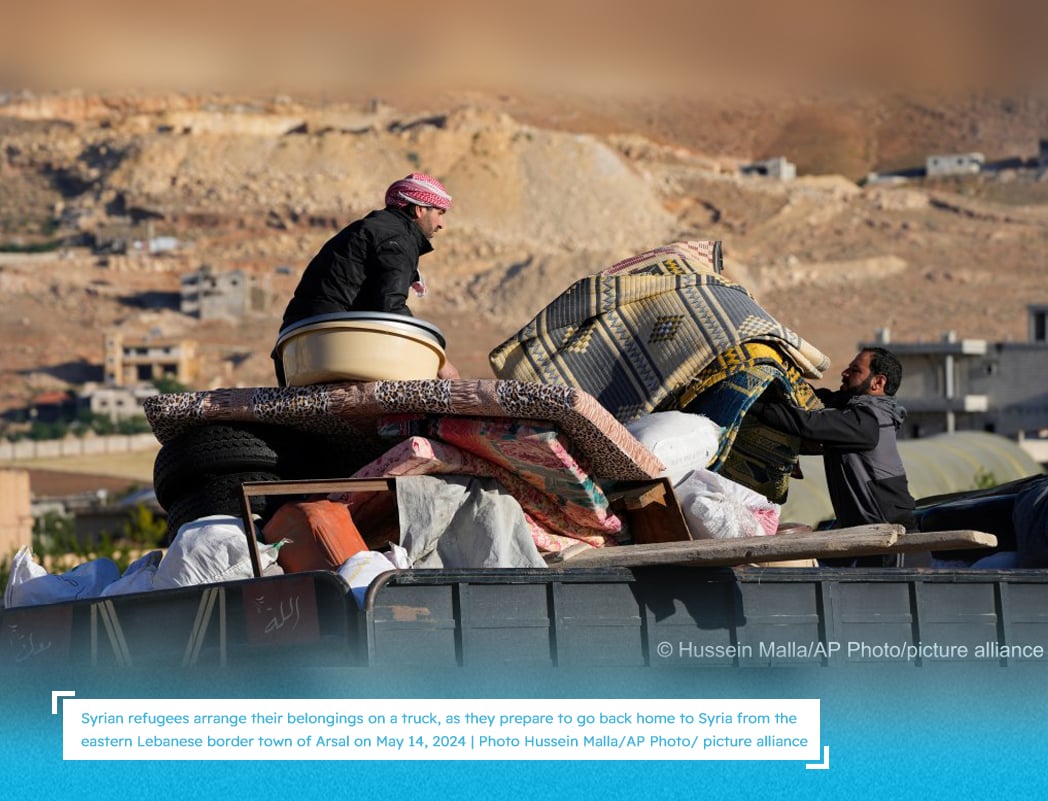
Languages
Available In
Lebanon should immediately halt forced deportations of Syrian refugees and reverse a set of unprecedented and draconian measures that were announced on 8 May 2024, seven organizations said in a joint statement today. Donor countries should urge Lebanon to uphold the principle of non-refoulement and ensure that any assistance provided is not used to facilitate abusive deportations.
On May 2, European Commission President Ursula von der Leyen visited Beirut and announced a one-billion-euro financial assistance package to Lebanon, which seeks to curb refugee arrivals to EU countries. About a fifth of the total financial assistance package is designated to support the Lebanese army and security services’ border management and migration control. Since then, Lebanese authorities have escalated the pressure on Syrians in the country and have issued new policies that would push even more refugees to flee the country.
On Wednesday 8 May, the Lebanese General Security announced a new set of rules and measures, including (unofficial translation):
- Requesting Syrians who violate the entry and residency system to go directly to the border departments and centers to grant them the necessary facilities to regularize their situation and leave Lebanese territory, under penalty of taking appropriate legal measures against those who do not leave.
- Emphasis on Lebanese citizens not to employ, shelter, or provide housing for Syrians residing illegally in Lebanon, under penalty of issuing administrative and judicial arrest reports against violators.
- Not allowing Syrians registered with the United Nations High Commissioner for Refugees to practice any paid work outside the work sectors specified for them.
- Resuming the organization of (voluntary and safe) returns of Syrian nationals wishing to return to their country under the auspices of the General Directorate of Public Security.
- Suspension of granting or renewing residency permits pursuant to a housing lease contract.
- Suspension of granting or renewing residency permits as a basis for a pledge of personal responsibility.
- Amending the conditions for renewing residence permits under financial guarantee.
- Closing all illegal establishments and shops managed or invested by Syrians, and taking appropriate measures against anyone who employs foreign workers in violation of the residency system and the labor law.
Since 9 May, dozens of raids and arrests have taken place across the country, while the Lebanese government has announced the resumption of return convoys to Syria. Shops run by Syrians have been closed down and there are widespread reports of residency permits being revoked.
In a context where at least 83% of Syrian refugees in Lebanon do not have access to legal residency, and Syrians who entered the country irregularly after April 2019 are deemed “illegal”, these measures put hundreds of thousands of Syrian refugees at immediate risk of forced deportation to Syria.
No parts of Syria are safe for returns. The United Nations continues to maintain that conditions in Syria are “not conducive to safe and dignified return”. In April 2024, the European Union Agency for Asylum (EUAA) found that high or substantive levels of indiscriminate violence continue to persist across Syria and that the risk of being persecuted remains widespread. In recent months, Syria has also experienced the worst escalation in violence since 2020. In February and March 2024, both the UN Commission of Inquiry for Syria and the Office of the UN High Commissioner for Human Rights (OHCHR) have issued reports that reiterated that Syria remains unsafe for return and that returnees are specifically being targeted upon return. Human rights organizations, including Amnesty International, Human Rights Watch and the Syrian Network for Human Rights, continue to document how Syrian security forces and government-affiliated militias arbitrarily detain, torture, disappear and kill refugees who return.
Lebanon, meanwhile, remains the country hosting the largest number of refugees per capita, with the government estimating that 1.5 million Syrian refugees currently live in the country. The country has struggled to assist refugees amid an acute economic crisis that has pushed over 80 percent of the population into poverty. Meanwhile, donor countries have dramatically reduced their funding for refugee programming. Further, in 2023, only 2,800 Syrians were resettled to the EU from Lebanon, which amounts to a mere 1% of the overall number of Syrians living in the country who were in need of resettlement.
Donors must shoulder their responsibility and take the necessary steps to improve the situation of Syrian refugees in Lebanon. They have an obligation to conduct a thorough human rights due diligence assessment to ensure that their funding does not contribute to human rights violations. Donor countries should also use the upcoming Brussels VIII Conference on the Future of Syria and the Region (27 May) to provide additional funding to support refugee and Lebanese host communities given the deteriorating situation in the country and resettle a greater number of Syrian refugees residing in Lebanon to Europe and the United States.
“By all accounts, Syria remains unsafe for return. Rather than providing a de facto green light to summary deportations of Syrian refugees, the US, EU and other donor countries should make clear that violations of the non-refoulement principle will have concrete consequences for their bilateral relations with Lebanon”, the organizations concluded.
Signatories:
11.11.11
Amnesty International
Centre Libanais des Droits Humains (CLDH)
EuroMed Rights
PAX
Refugees International (RI)
Syrian Network for Human Rights (SNHR)


